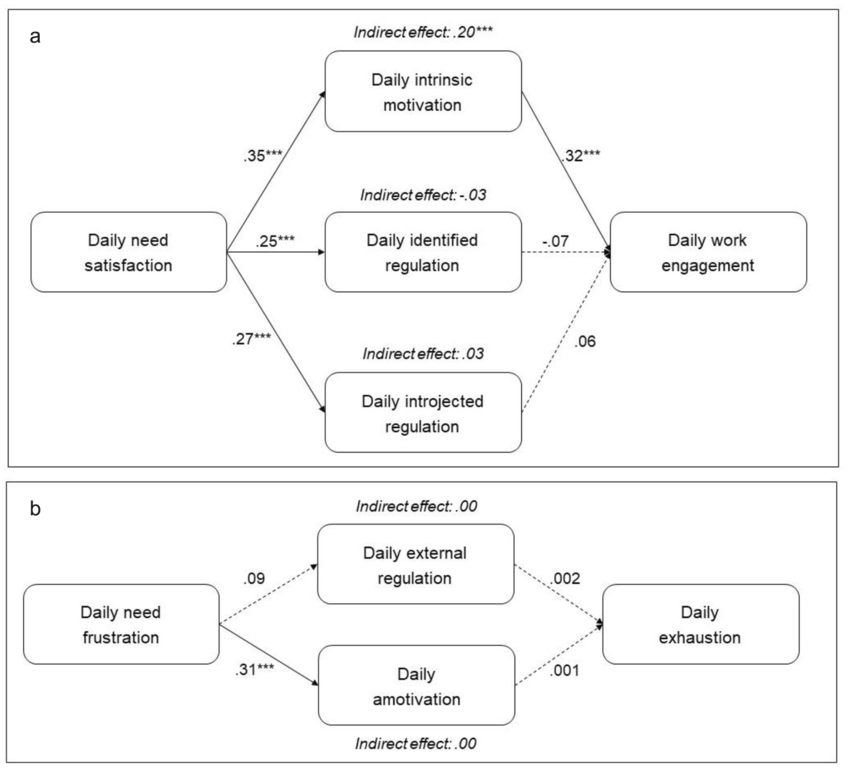The different effects of the fulfillment and frustration of basic needs
Within self-determination theory, much attention has been devoted for years to the positive effects of supporting basic psychological needs. Somewhat less attention has been paid to the undermining of motivation and functioning through frustration of needs. A new study looks at both.
The importance of basic psychological needs
Much research in self-determination theory (SDT) has shown the great importance of universal basic psychological needs.- The basic needs are: the need for autonomy, the need for competence, and the need for relatedness.
- When these needs are met, we function optimally: we feel good and we function well.
- However, when the fulfillment of these basic needs becomes frustrated, we function and feel worse.
Needs satisfaction and needs frustration
Most research within the SDT to date has focused on the effects of needs support. Need frustration has been studied less extensively. In this article you can read some examples of things that contribute to needs support and things that contribute to needs frustration.However, from the research that has been done so far, it is becoming increasingly clear that in addition to supporting the basic needs, it is also important to try to prevent the frustration of the basic needs (read more). (See also this and this).
The importance of a dual process approach
Recently we have become increasingly aware of the need not only to do useful things, but also to consciously refrain from doing harmful things ( read more ). Just doing the right thing is not enough. Leaving out the bad is also important. So we need a dual process approach.Preventing frustration of needs even more important than satisfaction of needs?
There is even reason to suspect that refraining from doing the bad might be even more important than doing the good. This reason has to do with the negativity bias. This is the phenomenon that we notice negative information more easily than positive information and that we tend to give more weight to negative information than to positive information.Psychologists sometimes translate the negativity bias as follows: negative is stronger than positive. Is therefore omitting the negative perhaps even more important than doing the positive? Is trying to avoid need frustration even more important than satisfying basic needs?
Study Coxen et al. (2023)
A new study by Lynelle Coxen et al. (2023) sheds some light on this question. The aim of these researchers' study was to understand the dual paths (to well-being and unwellness) of daily need gratification and frustration through the different motivational schemes. They also compared whether daily need satisfaction was more strongly associated with positive outcomes than need frustration and whether need frustration was more strongly associated with unfavorable outcomes.An intensive longitudinal quantitative research design with a multilevel approach was used. Employees in small and medium-sized enterprises were asked to complete surveys daily for 10 working days (N = 68/n = 557). The data were analyzed using multilevel structural equation modeling.
Results
The diagrams below summarize the results of the study:The results showed that both daily needs satisfaction and frustration indirectly impacted work engagement and exhaustion via intrinsic motivation.
The indirect effect of daily needs satisfaction on work engagement was larger than needs frustration, while daily needs frustration was more strongly related to exhaustion via intrinsic motivation.
Needs support contributes to intrinsic motivation and work involvement. Frustration of needs increases the likelihood of amotivation and exhaustion.
A two-track policy is therefore necessary, which simultaneously supports the basic needs of individuals and consciously prevents frustration of needs.
The indirect effect of daily needs satisfaction on work engagement was larger than needs frustration, while daily needs frustration was more strongly related to exhaustion via intrinsic motivation.
Conclusion
This study does not show that the effects of needs frustration are stronger than those of needs support. They are different.Needs support contributes to intrinsic motivation and work involvement. Frustration of needs increases the likelihood of amotivation and exhaustion.
A two-track policy is therefore necessary, which simultaneously supports the basic needs of individuals and consciously prevents frustration of needs.


Comments